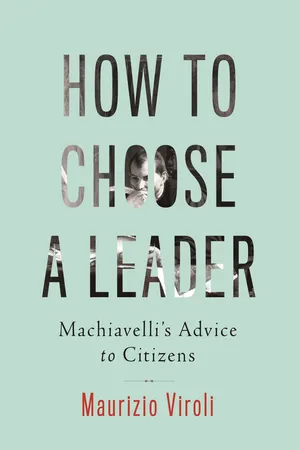
How to Choose a Leader
Machiavelli's Advice to Citizens
Maurizio Viroli
- 144 pages
- English
- ePUB (mobile friendly)
- Available on iOS & Android
How to Choose a Leader
Machiavelli's Advice to Citizens
Maurizio Viroli
About This Book
Twenty essential tips for picking great leaders from the father of modern politics One of the greatest political advisers of all time, Niccolò Machiavelli thought long and hard about how citizens could identify great leaders—ones capable of defending and enhancing the liberty, honor, and prosperity of their countries. Drawing on the full range of the Florentine's writings, acclaimed Machiavelli biographer Maurizio Viroli gathers and interprets Machiavelli's timeless wisdom about choosing leaders. The brief and engaging result is a new kind of Prince —one addressed to citizens rather than rulers and designed to make you a better voter.Demolishing popular misconceptions that Machiavelli is a cynical realist, the book shows that he believes republics can't survive, let alone thrive, without leaders who are virtuous as well as effective. Among much other valuable advice, Machiavelli says that voters should pick leaders who put the common good above narrower interests and who make fighting corruption a priority, and he explains why the best way to recognize true leaders is to carefully examine their past actions and words. On display throughout are the special insights that Machiavelli gained from long, direct knowledge of real political life, the study of history, and reflection on the political thinkers of antiquity.Recognizing the difference between great and mediocre political leaders is difficult but not at all impossible—with Machiavelli's help. So do your country a favor. Read this book, then vote like Machiavelli would.
Frequently asked questions
Information

Table of contents
- Cover Page
- Title Page
- Copyright Page
- Contents
- Introduction: Why Ask Machiavelli?
- I: Citizens ought to “keep their hands on the republic” and “choose the lesser evil.”
- II: “Judge by the hands, not by the eyes.”
- III: “It is the common good which makes republics great.”
- IV: “Whoever desires constant success must change his conduct with the times.”
- V: “How by the delusions of seeming good the people are often misled to desire their own ruin; and how they are frequently influenced by great hopes and brave promises.”
- VI: “Men almost always follow the beaten track of others, and proceed in their actions by imitation.”
- VII: “Great men and powerful republics preserve an equal dignity and courage in prosperity and adversity.”
- VIII: “And although these men were rare and wonderful, they were nevertheless but men, and the opportunities which they had were far less favorable than the present; nor were their undertakings more just or more easy than this; neither was God more a friend of them than of you.”
- IX: “For it is the duty of any good man to teach others that good which the malignity of the times and of fortune has prevented his doing himself; so that amongst the many capable ones whom he has instructed, someone perhaps, more favored by Heaven, may perform it.”
- X: “It is very difficult, indeed almost impossible to maintain liberty in a republic that has become corrupt or to establish it there anew.”
- XI: “Poverty never was allowed to stand in the way of the achievement of any rank or honor and virtue and merit were sought for under whatever roof they dwelt; it was this system that made riches naturally less desirable.”
- XII: “In well-regulated republics the state ought to be rich and the citizens poor.”
- XIII: “Prolonged commands brought Rome to servitude.”
- XIV: “I love my country more than my soul.”
- XV: “For where the very safety of the country depends upon the resolution to be taken, no considerations of justice or injustice, humanity or cruelty, nor of glory or of shame, should be allowed to prevail. But putting all other considerations aside, the only question should be, ‘what course will save the life and liberty of the country?’”
- XVI: “The authority of the dictatorship has always proved beneficial to Rome, and never injurious; it is the authority which men usurp, and not that which is given them by the free suffrages of their fellow-citizens, that is dangerous to civil liberty.”
- XVII: “I say that I have never practiced war as my profession, because my profession is to govern my subjects and to defend them, and, in order to be able to defend them, to love peace and to know how to make war.”
- XVIII: “An excellent general is usually an orator because, unless he knows how to speak to the whole army, he will have difficulty in doing anything good.”
- XIX: “A prince becomes esteemed when he shows himself either a true friend or a real enemy.”
- XX: “To insure a long existence to religious sects or republics, it is necessary frequently to bring them back to their original principles.”
- Notes
- Sources of the Quotations
- Note on the Texts